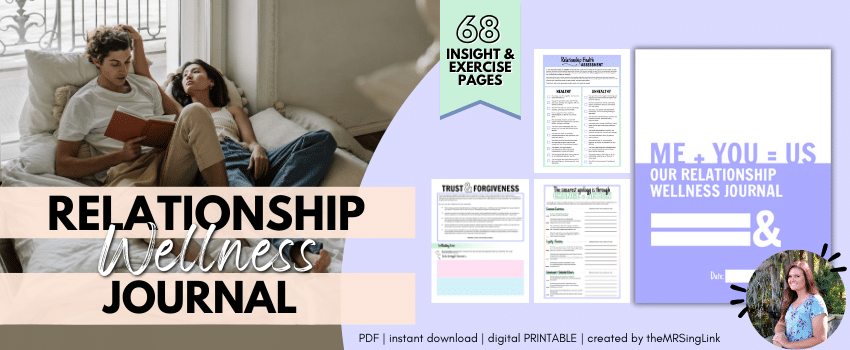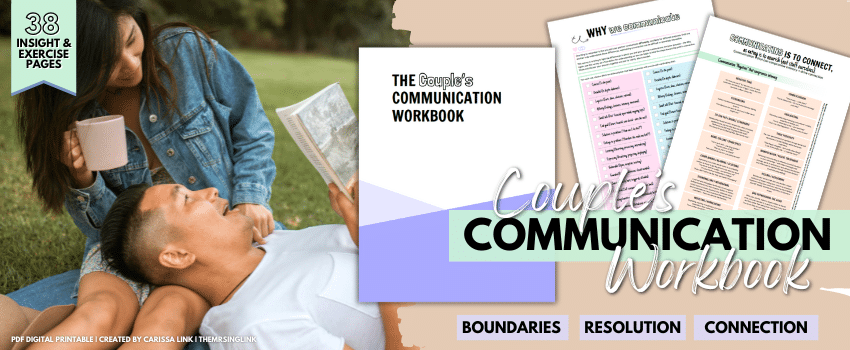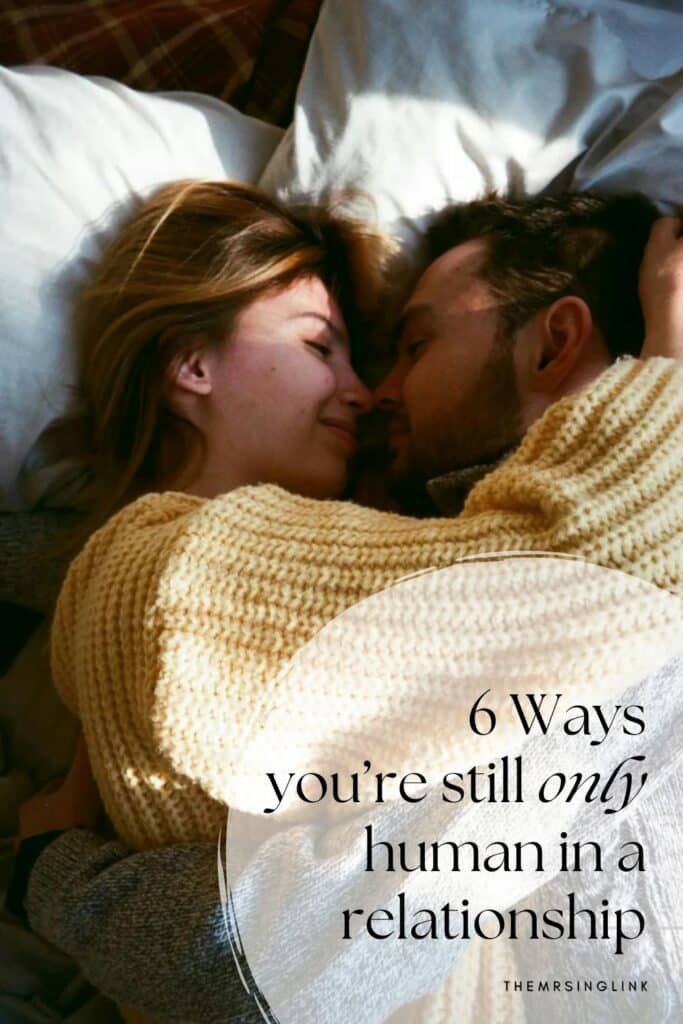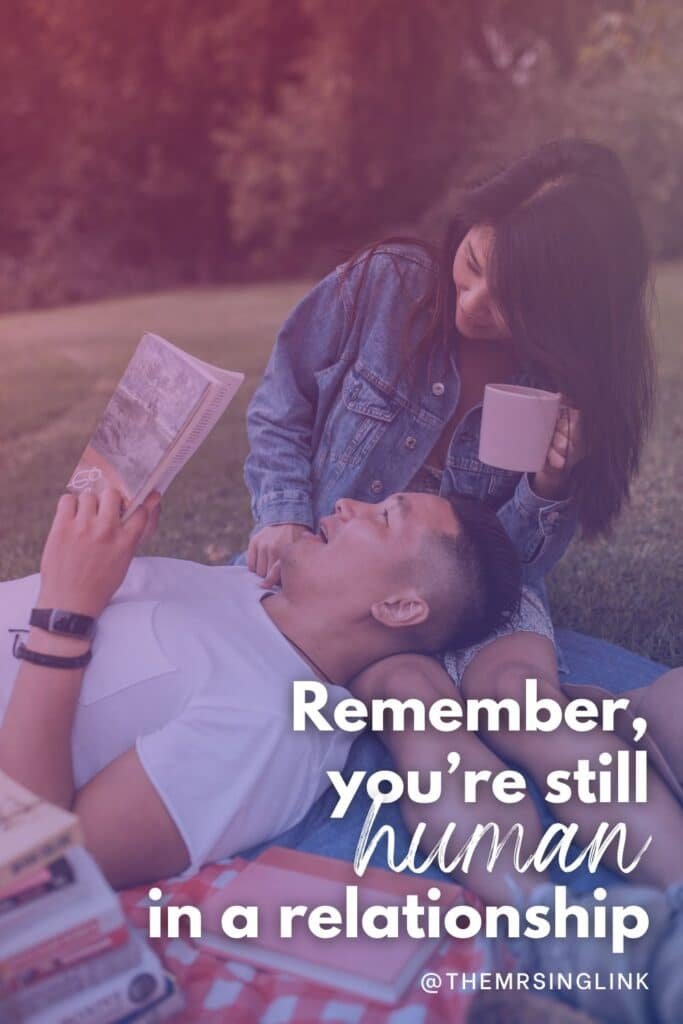Whether you’re dating someone new or you’re in a committed relationship, remember, you’re still human. Does this really need to be said? Yes, yes it does. And I think many will be bamboozled when they read this post, mainly because the brain will go, “Yeah, of course, duh,” but then also be like, “Oh? Ohhhhh.“
IMO, I think many fear that our humanity will cost us our relationship whether we’re aware of that fear or not. That’s why I’m taking it back to basics, and hopefully as you read you’ll understand why. Because it’s stupidly simple: you’re still human in a relationship, not a super-human. And we all need that little reminder from time to time.

Remember, you’re still human in a relationship
You’ll have bad days
I’m starting to notice two things; 1. people are literally forcing themselves to have it together all the time, and 2. people often weaponize their feelings. First off, who in the world said you [will/can] no longer have bad days while being in a relationship? Second, who in the world said we’re entitled to use our bad days against others, particularly our partner?
You’re still human, so of course you will/can have bad days! Yet for some reason I am seeing the notion that, because you’re dating someone or are in a relationship, bad days simply don’t apply to you anymore. Or that having a less-than-ideal reaction to the experience is frowned upon. In turn, people are suppressing their anger, anxiety, hurt, and sorrow and/or are weaponizing their feelings (against their partner or the relationship).
It’s no wonder many fear that their internal response to experiencing bad days may cost them their relationship or, rather, ultimately change how their partner feels about them. We need to be more accepting of the fact that we can experience *off* days while still resting assuredly in other circumstances. For example, you can have a terrible day at work (and fully experience that) without it having an effect on your partner and the status of your relationship.
That being said, remember this also: the person you’re dating or your partner is also human; they, too, will and can have bad days. So, for instance, your partner can have a terrible day at work (and fully experience that) without it having an effect on you and the status of your relationship.
You’re going to make mistakes
Yes, you are. Just because you’re seeing someone or are in a relationship doesn’t exempt you from human imperfection. That means, yes, you’re also not completely exempt from the unimaginable, such as hurting or disappointing your partner.
Listen, that isn’t saying to condone anything and everything, either. It simply means that we are to extend grace and forgiveness for our mistakes while assuming self-accountability. Isn’t that what we anticipate from others over being condemned?
Otherwise, the alternative is falsely convincing ourselves we can do nothing wrong and no harm (to our partner or in the relationship), which is absolute denial, self-centered and, well, anti-human. To be human means allowing space for imperfection so that we can overcome (to pick ourselves up again and again) and persevere, not as to glorify or wallow in our imperfection.
Alas, your partner is also human, and is going to make mistakes of their own.
You’re not always going to be happy
This one might sting a little, and I apologize. But it would be wrong of me to say that you will and should always be *happy* – we’re simply not willing to hear that enough to understand the truth in it.
It’s merely impossible that you will always be happy with your partner or in a relationship. It’s also incredibly unrealistic to say that you should be! In saying so doesn’t mean to settle for unhappiness or misery, either.
You’re human, which means you’re not a robot with happy settings on default. You can’t just do a factory reset, either. That means you experience a range of mixed emotions and feelings all day, every day! At the end of the day, however, it is still very possible to be blessed, grateful, content and satisfied – that doesn’t always mean we’re to be the socially accepted construct of *happy*.

That said, just because you experience a period where you’re not exactly bouncing off the walls ecstatic or gleeful doesn’t mean you’re depressed, either. The key point here is to understand that happiness is a result of something; similar to pleasure-seeking, happiness is our dopamine fix that only lasts so long.
With that, people don’t typically equate happiness to peace, joy or contentment. Personally, I find that happiness is often [treated like] the caffeine hit we receive from coffee or an energy drink. Think about it, could we recognize true joy and peace without it [happiness]?
Is happiness even cutting it these days in our lives, or are we always in search of more? When happiness becomes the addiction, everything but is lackluster and not received gratefully but self-deservingly.
We also struggle with the idea that we can experience opposites at the same time; meaning, you can be happy (about one thing) and also sad (about another). Likewise, your partner is a human being as well; meaning, it is unrealistic to expect a 24/7/365 happy partner…much less *your* definition of happiness.
You’re not always going to be right
Let me say it again – you won’t always be right. Was that a bit triggering? Yeah? Then read it this way, “There will be times when my partner is right and I am wrong,” and repeat until you no longer feel that tight grip on your throat.
As humans, it’s more important to be right than to be humbled. Why is that? Truly, we often make enemies of those who correct and expose us. It takes little breath to call someone a know-it-all yet we’re hell-bent on being right – aren’t we the know-it-all, too?
Being right all the time requires a lot of effort and it takes more than you get from it (few will understand this). Being humbled, on the other hand, takes a lot of effort because it forces us to deny ourselves (to be vulnerable, make ourselves low, and leaving us exposed). The thing is, when you get comfortable not being right all the time about everything, little to no effort is involved.
People really are missing out on that level of peace.
You won’t be able to meet or fulfill their every need
Uh oh, I’m about to get myself in trouble, huh? But it’s true. I know it – I can’t fulfill every single one of my husband’s needs. The same way he can’t mine. Because the truth is, if he or I dies, we’re still each responsible for ourselves.
That doesn’t mean he and I don’t try. But then, what, is this expected? That’s a very heavy burden to place on the shoulders of the supposed one we Love (above all others). My husband is only human, and it’s physically impossible for him to not only take care of his needs but also carry mine, let alone to expect him to.
It’s the similar take to the oxygen mask on an airplane – you can’t help someone if you’ve not taken care of yourself. You also can’t help someone who doesn’t want to help themselves. There’s a balance to this, and while it may not ever be the perfect balance, it’s being able to accept that you’re human and won’t be able to fulfill someone’s every need.
[pt_view id=”bb67dcde9b”]
You’re not always going to feel loved or loving
We often say the opposite of Love is Hate, right? Okay, but, if we’re not always feeling loved or loving…does that automatically mean we’re hated or hateful? I hope that’s a no.
Since we typically equate Love to a feeling or action, we’re pretty quick to assume it isn’t Love if neither are present. For reference, you notice a man and older woman crossing a busy street, and the man doesn’t help the older lady across. While you see his behavior as unloving, that same man fifteen minutes prior had fully paid for someone’s groceries who couldn’t afford it. Have you sat with the many times you could have been loving to others but weren’t? Does that make you hateful? Then would it be totally accurate for someone to assume that of you because of one instance?
While we can always strive to Love more, we’re human in a fallen world (yes, I believe that), and most of us lose sight of the fact that our capacity to Love wears thin when we rely on our own efforts, and that we’re in constant need of new hearts.
Maybe it’s just me, though I doubt it, but there really are times I don’t feel as Loving as I could be in my marriage or towards my husband. Now, does that mean I am being hateful or unloving? No, but I guess you could say the way I am and the things I’m doing are rather basic – not *over the top* or *showy*.
Personally, I also think we’ve inflated Love to be more than what it actually is, especially in relationships. So when we’re not exactly feeling butterflies or romantic sparks all the time, we chalk it up to feeling unloved or that we don’t love someone anymore. And that’s dangerous.
You’re human, and while all humans are wired to connect (with others), I don’t need a psychology degree to understand that we won’t be connected (or feel the desire to be) with other humans every minute of every day. That doesn’t make us unloving or unloved.


